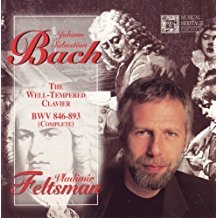-
Posts
13,205 -
Joined
-
Last visited
-
Donations
0.00 USD
Content Type
Profiles
Forums
Events
Blogs
Everything posted by Larry Kart
-
I've got the Westchester Jazz Workshop album on Fresh Sound coupled with the John Glasel Brasstet. You get a belated gold watch from me-- Riccatelli's is terrific, unique music.
-
Can't be sure, but I would guess the late '50s/early '60s -- about the time he formed the band that went to Europe with that stage show. What always seemed strange to me about this is that QJ's own writing early on (e.g. for for a good many EmArcy albums by Adderley, Jimmy Cleveland, etc. and certainly for his own fine ABC-Paramount album "This Is How I Feel About Jazz") was so distinctive in its voicings -- traits that none of those ghostwritten scores tried to reproduce. Among the last QJ-labeled charts that I felt pretty sure were his were the ones, or some of the ones, on the Basie album that included his composition for "Lena and Lennie."
-
Reference was to the once well-known in jazz circles fact that after a certain point in his career as an arranger, Quincy farmed out much of the work credited to him to ghostwriters -- the prolific Billy Byers chief among them. The cover of one "arranged by Quincy Jones" album, don't recall which one, has a photo of members of the band and their music stands. On one of the open scores, Byers name can be seen at the top.
-
Interesting how much Byrd's style changed over a rather short span of time; his playing here being Style One, while by the time of, say, "Fuego" or "Off To the Races" he was well into Style Two (much more brassy and round in sound, and with the number of notes per unit of time being fairly well pared down) or maybe even Style Three. And there were more to come. Style Two certainly owed a debt in passing to Clifford Brown, but once one had heard the Byrd of Style Two, it was unmistakably him, a personal translation of Brownie. P.S. I think that Byrd's actual technical approach to playing the instrument changed during this time -- from the pressure to no-pressure system or vice versa (I'm no expert there).. Then on "Fuego" he was playing the pocket trumpet, which made a difference.
-

What Classical Music Are You Listening To?
Larry Kart replied to StarThrower's topic in Classical Discussion
BTW, on Amazon there's a an enthusiastic customer's review of the above Shapero album that's purportedly from "George Perle." I assume that was someone's idea of a joke, though it's not impossible that over time the real George Perle's view of the work turned 180 degrees. But if that were the case, I would think that the real Perle would say a little something about how what he shouted at the premiere of the work and the apparently dire effect the resulting ruckus had on Shapero. -

What Classical Music Are You Listening To?
Larry Kart replied to StarThrower's topic in Classical Discussion
https://www.youtube.com/watch?v=MMkoHveSa0Q https://www.youtube.com/watch?v=-NuED8-SfWs -

What Classical Music Are You Listening To?
Larry Kart replied to StarThrower's topic in Classical Discussion
Fascinating works, all of them, especially the Sonata in F Minor (1948). Avowedly based on classical models, especially late Beethoven, this work ran so counter to then prevailing "progressive modern" compositional fashion that the work was hissed and booed by members of the audience at its 1949 NYC premiere (young serialist composer George Perle stood up and shouted either "Hurrah Beethoven!" or "Viva Beethoven!" -- accounts differ.) In any case, this hostile reception -- most of the those who booed and hissed were, like Perle, fellow young composers -- "...was enough for Shapero (b. 1920) to lapse into creative silence for many years," retreating into academic life to teach at Brandeis University from 1951 to 1988. I knew of this story and also knew of Shapero's similarly neo-classical Symphony for Classical Orchestra, which Andre Previn revived and recorded in the 1980s; there also was a previous recording of the Symphony from the early '50s or late '40s cond. by Leonard Bernstein. What I didn't reckon on is that while the language of these works is staunchly tonal and that there is the late-Beethoven skeleton to the Sonata in particular, the results sound quite unique and quite American to boot. Primarlly this is a matter of what might be called spacing. The harmonic relationships are tonal, but there is quite often so much distance in pitch (and even register) between one figure or gesture and the next that the music typically seems to be taking place in mid-air and at some height ... above, say, the Grand Canyon. Further, the emotional effect of this music and its methods -- at once so "open air" and with such a sense of calmly striding purposefulness -- is unique, too. Again, Shapero was an avowed neo-classicist, and the example of Stravinsky's personal transformative version of that mode was before his eyes, as were some aspects (in terms of spacing) of Copland. But then Shapero doesn't sound much like Stravinsky or Copland either. (BTW, Copland earlier on had spoken somewhat negatively of Shapero's "compulsion to fashion his music after some great model.... he seems to suffering from a hero-worship complex -- or perhaps it is a freakish attack of false modesty...." Be that as it may, just listen to these works and tell me they don't sound unique -- and, I think, terrific.) -
Geez -- I guess I did say/write it. Well, what I believe now is what I said above.
-
Bird's playing on this recording "is at a level notably higher than any Parker had reached before"? Did I say that? I hope not because I don't believe it. It's superb Bird, but there's lots of other superb Bird of various moods and kinds.
-
Nice story, good record.
-
The performances I'm referring to above are the first six tracks on "Charlie Parker, Boston 1952" (Uptown) , with Joe Gordon on trumpet, Twardzik, Mingus, and Roy Haynes, rec. at the Hi-Hat 12/14/1952. Tracks 7-13 on that album are from the Hi-Hat 1/18/1954, with Herbie Williams, Rollins Griffith (pno.), Jimmy Woode (bs.), and Marquis Foster (dr.). Good stuff but IMO not close to the 12/14/1952 material. More from the Parker, Herbie Williams, Rollins Griffith etc. group at the Hi-Hat, from 12-18 & 20, 1953 and 1/24/1954, is on "Bird at the Hi-Hat" (Blue Note). No one said it did. I was making a comparison, in terms of Parker's musical-emotional mood as I perceive it, between the fiercely intense Bird of the Washington quartet performances and the much more relaxed but no less creative Bird of the first six tracks on "Charlie Parker, Boston 1952" (Uptown).
-
The quartet side of the album below to me epitomizes the "hellhound on his trail" Parker. Hear this track for example: (p.s. I don't it's just a matter of tempo here, though it is way "up.") This track too:
-

What Classical Music Are You Listening To?
Larry Kart replied to StarThrower's topic in Classical Discussion
(Piano) Vladimir Feltsman (It's only $5.07 right now for Feltsman's complete WTC, in its MHS incarnation, on Amazon. It was originally on MusicMasters.) (Harpsichord -- First book) Pierre Hantai -
Love, and am stunned by, "Ride the Wind." I'll certainly listen again to “Discussions," but the first time though I didn't care for it much. In particular, I thought the two group improv pieces were full of improv cliches, percussionist William Winat sounded rather square to me, and none of the transcribed and then orchestrated pieces seemed to hang together that well or be that well-played by the ensemble by comparison to “Ride the Wind.” If I read the notes to “Discussions” correctly, Roscoe didn’t orchestrate any of these pieces on the album; based on “Ride the Wind” his role as orchestrator seems to be crucial.
-

What are some jazz sound tracks from movies that you like?
Larry Kart replied to Hardbopjazz's topic in Miscellaneous Music
Sorry -- you're right about "The Hustler." -
Apparently not.
-

What are some jazz sound tracks from movies that you like?
Larry Kart replied to Hardbopjazz's topic in Miscellaneous Music
"The West Coast film music featured I found painful to listen to, because all the soloists who improvised or played melodies, played with this horrible, corny-assed vibrato that made me want to puke." If you were referring to David Raksin's soundtrack for "Too Late Blues" -- which along with "The Hustler" is the only soundtrack on the album that stems from the West Coast ("Satan in High Heels" features NYC-based musicians) -- then you're saying that Benny Carter (alto saxophone soloist on the soundtrack) "played with this horrible, corny-assed vibrato that made [you] want to puke"? And the trumpeter is Uan Rasey, perhaps best known for his work here: -

What are some jazz sound tracks from movies that you like?
Larry Kart replied to Hardbopjazz's topic in Miscellaneous Music
I thought all the Parker solos on the soundtrack of "Bird" were actual Parker solos taken from recordings, with new rhythm section work by contemporary studio guys (e.g. drummer John Guerin). The score for the film was otherwise the work of Niehaus, but I don't think that he played in place of Parker on the soundtrack. -
What Chet said was better: "Sorry about your old man."
-
"Chet Baker in Tokyo" may be the best, along with the Steeplechases Paul mentioned above.
-

Surveying the scene, the Half-Price way
Larry Kart replied to Larry Kart's topic in Miscellaneous Music
Only two HPB stores near me, one about a 35 minute drive, the other about 10 minutes. I hit that one several times a week. They know me by name there. -

Surveying the scene, the Half-Price way
Larry Kart replied to Larry Kart's topic in Miscellaneous Music
Isn't the Half-Price Dallas store the "anchor" store for the whole chain? That may account for part of the abundance there. -
Don't agree. I've been into Graettinger's music from way back when; it never ceases to fascinate.
-

Surveying the scene, the Half-Price way
Larry Kart replied to Larry Kart's topic in Miscellaneous Music
No, I've never seen that kind of stuff at our Half-Price: if I did, I'd be buying it. They do have/get a lot of LPs but not anything unusual by and large.
_forumlogo.png.a607ef20a6e0c299ab2aa6443aa1f32e.png)



